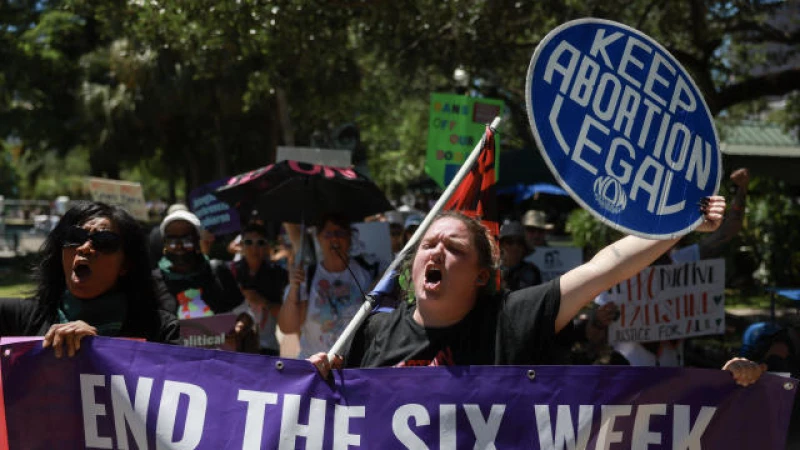Washington — Florida health regulators have released a new guideline today that outlines exceptions to the state's six-week abortion ban. The guideline details the specific treatments that are permitted for certain medical conditions that pose a risk to the health of both the pregnant woman and the fetus.
The guideline issued by the Florida Agency for Health Care Administration comes on the heels of the implementation of Florida's recent abortion restrictions. These new laws have significantly restricted abortion access in the Southeastern region.
The guideline specifies that treatments for conditions such as ectopic pregnancy and trophoblastic tumor, a rare tumor that develops where the placenta connects to the uterus, are not classified as abortions. Additionally, it states that if a physician needs to induce delivery to address premature rupture of membranes and the fetus does not survive, it is not considered an abortion.
These conditions may arise after the six-week gestation period and pose an immediate threat to the health and well-being of women and unborn children. Prompt treatment in hospitals and abortion clinics is crucial to address these conditions, according to state regulators.
The agency said it initiated the rulemaking to "safeguard against any immediate harm that could come to pregnant women due to disinformation," and accused the media, Biden administration and advocacy groups of perpetuating a "deeply dishonest scare campaign" to misrepresent the state's abortion law. The emergency rule is necessary "to ensure the health, safety, and welfare of pregnant women and unborn babies during medical emergencies," according to the Agency for Health Care Administration.
Florida's six-week ban was signed into law by Gov. Ron DeSantis last year but did not immediately take effect, as the state supreme court considered a challenge to a separate measure prohibiting abortions after 15 weeks of pregnancy. That 15-week restriction was passed by the state legislature in April 2022, months before the U.S. Supreme Court overturned Roe v. Wade.
The Florida Supreme Court in early April upheld the 15-week ban, clearing the way for the more restrictive, six-week law to take effect.
The ban includes exceptions in cases of rape, incest and human trafficking up to 15 weeks of pregnancy. It also allows physicians to terminate a pregnancy if necessary to save the life of the mother or prevent "a serious risk of substantial and irreversible physical impairment."
Still, supporters of abortion rights have warned that the law is effectively a near-total ban on abortion, since many women do not know they are pregnant until after six weeks gestation.
Since the Supreme Court dismantled the constitutional right to abortion in June 2022, 14 states have outlawed abortion with limited exceptions. Another seven ban abortions in the first 18 weeks of pregnancy, according to the Guttmacher Institute, a pro-abortion rights research organization.
Physicians in states with strict abortion restrictions have faced challenges in navigating the limited exceptions to the bans. Recently, the Supreme Court deliberated on a case that pits Idaho's almost complete abortion ban against a federal law mandating hospitals to offer stabilizing care to patients with medical emergencies. The Biden administration contended that according to the federal law, stabilizing treatment could include abortion care. In such situations, the federal regulation takes precedence over state laws that limit access to abortion.







